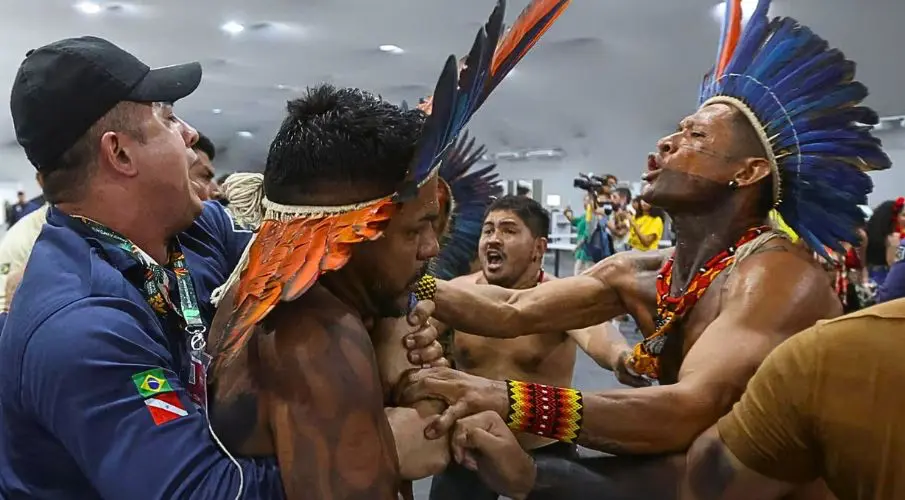Belém, Brazil – These days, Belém is not only the gateway to the Amazon but the place where it will be decided whether the world is ready to take its own future seriously. Two years after the historic Dubai decision that for the first time wrote the global farewell to coal, oil and gas into a shared document, a broad group of states at COP30 is trying to force the next step. And for the first time in a long while, politics seems to show a spark of courage. The new momentum was unleashed by none other than Brazil’s President Luiz Inácio Lula da Silva, who set a clear and completely unexpected signal just days before the negotiations began. His call to “truly overcome” global dependence on fossil fuels has strengthened countries from Europe, Africa, Latin America and the Pacific. France, Germany, Kenya and Colombia are driving the attempt behind the scenes to push the phaseout pathway into the official negotiation package – even though it is not formally on the agenda.
It is about more than words. The initiators want a consensus decision by all nearly 200 states, not a nonbinding paper from those already convinced. They now speak of a circle of 50 to 60 supporters – and they want to expand it to 100. Their goal is clear: to finally bring the historic 2023 formulation, the transition “in a just, orderly and equitable manner,” to life. Numbers, data, plans – something that can be reviewed. Something by which countries can be measured.

But every step forward casts an immediate shadow. Saudi Arabia is blocking without compromise, Russia mocks the idea as a luxury problem of wealthy nations, and in several negotiation rooms, oil-producing states are trying to keep any mention of fossil fuels out of new decisions. Around 70 countries are said to be opposed to going beyond the Dubai consensus at all. And Brazil’s role as host is filled with contradictions of its own: just days before the summit began, the government gave the green light for a new oil project at the mouth of the Amazon River.
In these already tense days, Belém reached a moment that struck the summit at its core. In the afternoon, indigenous leaders and climate activists broke through the sterile architecture of the conference and occupied the Blue Zone – the tightly controlled core of the COP, where normally only accredited delegates pass through. With banners, chants and ceremonies, they demanded an immediate halt to new oil and gas projects, especially in the Amazon region, and accused negotiators of once again sacrificing the protection of indigenous territories to diplomatic bargaining. Dozens of groups from Brazil, Colombia and several island states took part. For a short time, access routes were closed, delegations had to find detours, and the sterile calm of the negotiation process abruptly ended. It was a moment that made visible just how thin the patience has become among those who stand at the front lines of droughts, floods and the loss of their homelands.

Belém shows these days what is at stake: the credibility of a global process that has promised for decades to take the climate crisis seriously, yet repeatedly fails because of those who cling to the old system. Whether out of convenience, calculation or sheer economic fear – it is the same forces that watered down every step forward in Dubai and now use all their power to prevent the fossil phaseout from becoming a commitment instead of an idea.
The world has not reached a point of abundance where it can afford such delays. And the people of Belém, whose rivers, soils and forests have long been paying the price of global inaction, know this better than most. The question at this COP is not whether a roadmap can be negotiated. The question is whether the international community can find the courage to end the fossil era not only rhetorically – but truly begin to do so.
Investigative journalism requires courage, conviction – and your support.
Please help strengthen our journalistic fight against right-wing populism and human rights violations. Every investigative report, every piece of documentation, every day and every night – all of it requires time, research and legal protection. We do not rely on advertising or corporations, but solely on people who make independent journalism possible. People like you.
Not everyone can give the same amount. But everyone can make a difference. Every contribution protects a piece of journalistic independence.
Updates – Kaizen News Brief
All current curated daily updates can be found in the Kaizen News Brief.
To the Kaizen News Brief In English
Danke für den Bericht. In Deutschland erfährt man kaum etwas darüber. Schön, das es den Kaizen Blog gibt.
Vielen dank. Es ist ein sehr wichtiges Thema, das viel mehr Präsens in den Medien verdient hätte …
So toll und mutig, dass sich diese Menschen beginnen zu wehren❤️👍. Ich würde gern auch deutlich mehr davon erfahren.
da hast du absolut recht. wir berichten täglich von der cop30
Ich glaube nicht, dass die Menschheit noch die Kurve kriegt. Zu wenige verstehen was vernetzte Systeme sind und wie schnell sie kippen können, wenn sie dann kippen und welche weitreichenden Folgen es dann haben wird, an die man gar nicht gedacht hat.
Ich bin 64 Jahre alt und werde noch einiges selber erleben (müssen), aber was auf die jetzigen Kinder/Jugendlichen zukommt mag ich mir gar nicht ausmalen. 🙈🥴
„Alte weiße Männer“ zerstören mit ihrer Habgier alles Leben auf diesem Planeten.
…da haben sie nicht unrecht und doch glaube ich daran, dass man mit gegenwehr, aufklärung und aufdeckung, dass ruder herumreissen kann